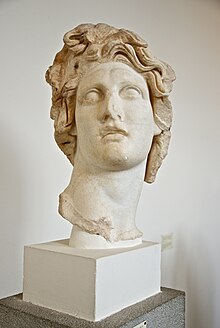Pyrois
| Helios | |
|---|---|
| Personification of the Sun | |

Head of Helios, middle period, Archaeological Museum of Rhodes
|
|
| Abode | Sky |
| Symbol | Chariot, horse, aureole, rooster, incense, heliotrope, sunflower |
| Personal Information | |
| Consort | Many including: Clymene, Klytie, Selene, Hecate, Perse, Rhodos, and Leucothea |
| Children | Many including: The Charites, Phaethon, The Horae, Aeëtes, Circe, Perses (brother of Aeetes), Pasiphaë, Heliadae and Heliades |
| Parents | Hyperion and Theia |
| Siblings | Selene, Eos |
| Roman equivalent | Sol |
Helios (/ˈhiːli.ɒs/; Ancient Greek: Ἥλιος Hēlios; Latinized as Helius; Ἠέλιος in Homeric Greek) was the personification of the Sun in Greek mythology. He is the son of the Titan Hyperion and the Titaness Theia (according to Hesiod), also known as Euryphaessa (in Homeric Hymn 31) and brother of the goddesses Selene, the moon, and Eos, the dawn.
Helios was described as a handsome titan crowned with the shining aureole of the Sun, who drove the chariot of the sun across the sky each day to earth-circling Oceanus and through the world-ocean returned to the East at night. In the Homeric hymn to Helios, Helios is said to drive a golden chariot drawn by steeds (HH 31.14–15); and Pindar speaks of Helios's "fire-darting steeds" (Olympian Ode 7.71). Still later, the horses were given fire related names: Pyrois, Aeos, Aethon, and Phlegon.
As time passed, Helios was increasingly identified with the god of light, Apollo. However, in spite of their syncretism, they were also often viewed as two distinct gods/titan (Helios was a Titan, whereas Apollo was an Olympian). The equivalent of Helios in Roman mythology was Sol.
...
Wikipedia
